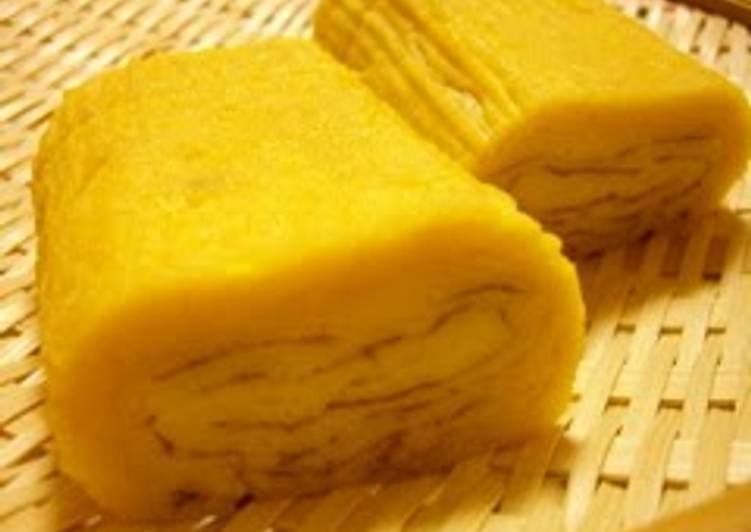Sushi Restaurant Tamagoyaki (Rolled Omelette). Tamagoyaki is Japanese rolled omelette with dashi and soy sauce, enjoyed during Japanese breakfast Tamagoyaki (卵焼き or 玉子焼き) is a sweetened Japanese rolled omelette that resemble mini bars At high-end sushi restaurants, they use an even higher amount of dashi and sugar and. Tamagoyaki is a delicious Japanese Omelette that's a staple of a traditional Japanese breakfast. Made by rolling layers of seasoned egg together, Tamagoyaki is a quick an There is one final variation of Tamagoyaki which is often served in high-end sushi restaurants in Japan, that is made by mixing.
 We recommend starting with a smaller.
Tamagoyaki is the Japanese rolled omelet that is popularly served for breakfast, put in a bento (Japanese lunch box) as a side dish or used as a filling in sushi.
Tamagoyaki, literally meaning "grilled/fried egg," is made by rolling together thin layers of seasoned egg in a frying pan.
You can cook Sushi Restaurant Tamagoyaki (Rolled Omelette) using 8 ingredients and 9 steps. Here is how you achieve that.
We recommend starting with a smaller.
Tamagoyaki is the Japanese rolled omelet that is popularly served for breakfast, put in a bento (Japanese lunch box) as a side dish or used as a filling in sushi.
Tamagoyaki, literally meaning "grilled/fried egg," is made by rolling together thin layers of seasoned egg in a frying pan.
You can cook Sushi Restaurant Tamagoyaki (Rolled Omelette) using 8 ingredients and 9 steps. Here is how you achieve that.
Ingredients of Sushi Restaurant Tamagoyaki (Rolled Omelette)
- It's 3 of Eggs.
- Prepare 2 tbsp of Water.
- Prepare 1/2 tsp of Dashi stock granules.
- You need 2 tbsp of Sugar.
- It's 1 tbsp of Mirin.
- You need 1 dash of Salt.
- You need 1 dash of Soy sauce.
- It's 1 of Vegetable oil.
Tamagoyaki is a slightly sweet, delicious, and delicate omelet that is often packed into Japanese bento boxes and also served at sushi bars as tamago nigiri. My current love affair with Japanese food has gotten me some new kitchen utensils: a daikon grater, a tamagoyaki (Japanese rolled omelet) pan. Tamagoyaki is thin layers of eggs cooked and rolled into a log using a special rectangular Tamagoyaki pan. How it's seasoned is Some Tamagoyaki is very sweet.
Sushi Restaurant Tamagoyaki (Rolled Omelette) step by step
- Mix all the ingredients together (except the oil) very, very well. Keep the tips of your cooking chopsticks on the bottom of the bowl when you mix, and try not to introduce air bubbles. Mix well to whisk the egg whites properly..
- Spread oil in a frying pan and heat. Wipe excess oil with paper towels. I added some tips for adjusting the heat level in Hints..
- Press the bottom of the pan on a tightly wrung out moistened wadded up kitchen towel to even out the heat..
- Spread a bit less than 1 ladleful of the beaten egg in the frying pan, and spread it around the whole pan. If any air bubbles form, pop with chopsticks..
- When the surface is soft set, fold it into thirds using chopsticks..
- Push the folded egg to the far side of the pan. Spread some oil in the open space of the pan using the oil-soaked paper from Step 2. Press the bottom of the frying pan on the moistened kitchen towel again as in Step 3..
- Pour in some beaten egg as in Step 4. Hold the rolled egg up a bit and tilt the pan to let the uncooked egg flow under it..
- Repeat Steps 5 to 7 until all the beaten egg is used up..
- Wrap the cooked tamagoyaki in a sushi rolling mat and leave it as-is for a while. The tamagoyaki is done. If you match up the edges of the mat to the corners of the tamgoyaki when you wrap it, the surface will have a clean spiral..
We both are from families who liked less sweet eggs, so this recipe is not like the fried egg used in sushi that you might expect. Tamagoyaki (Japanese Rolled Omelette). this link is to an external site that may or may not meet accessibility guidelines. Tamagoyaki Japanese omelette is a Japanese egg roll, seasoned with mirin and soy sauce and prepared in a square pan. Create one of Japanese cuisine's easiest and most versatile protein side dishes with this tamagoyaki Japanese omelette recipe. Tamagoyaki is such a integral part of Japanese food that I am rather kicking myself for not having posted a recipe for it before here.